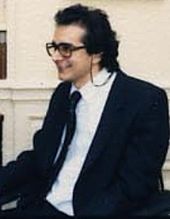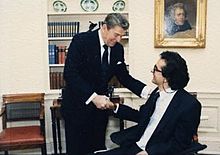Charles Krauthammer facts for kids
Quick facts for kids
Charles Krauthammer
|
|
|---|---|

Krauthammer in 1986
|
|
| Born |
Irving Charles Krauthammer
March 13, 1950 New York City, U.S.
|
| Died | June 21, 2018 (aged 68) Atlanta, Georgia, U.S.
|
| Alma mater | McGill University (BA, D.Litt.-Hon.) Balliol College, Oxford Harvard University (MD) |
| Occupation |
|
| Years active | 1978–2018 |
| Employer |
|
| Spouse(s) |
Robyn Trethewey
(m. 1974) |
| Children | 1 |
Charles Krauthammer (born March 13, 1950 – died June 21, 2018) was an American writer and political expert. He was known for his weekly columns in The Washington Post, which were published in over 400 newspapers around the world. In 1987, he won the Pulitzer Prize for his insightful writing.
When he was in his first year of medical school, Charles had a diving accident that left him unable to move his legs. After recovering for over a year, he finished medical school and became a psychiatrist. He even helped create an important guide for understanding mental health conditions. Later, he worked for the government, writing speeches for Vice President Walter Mondale.
In the 1980s, Charles Krauthammer started a new career as a political writer and commentator. He became a regular face on TV news shows, sharing his opinions on important national and world issues. He was a strong voice for conservative ideas, especially about how the United States should act on the global stage.
In 2017, Charles stopped writing and appearing on TV because he was battling cancer. He passed away on June 21, 2018, at the age of 68.
Contents
Early Life and Education
Charles Krauthammer was born in New York City on March 13, 1950. His father was from Ukraine and his mother was from Belgium. His family spoke French at home. When he was five, they moved to Montreal, Canada. During the school year, they lived in Montreal, and in the summers, they stayed in Long Beach, New York. Both of his parents were Orthodox Jews, and Charles went to Herzliah High School.
He attended McGill University in Montreal, where he studied economics and political science. He graduated with top honors in 1970. Charles said that his time at McGill, which was a place of strong political feelings, made him dislike extreme political views. He felt he was "somewhere in the middle." After McGill, he studied at Balliol College, Oxford, in England, before returning to the United States for medical school at Harvard University.
During his first year of medical school, a diving accident caused him to become paralyzed from the waist down. Despite this, he continued his studies and graduated from Harvard Medical School in 1975. From 1975 to 1978, he worked as a resident in psychiatry at Massachusetts General Hospital. He even identified a new type of bipolar disorder during this time.
In 1978, Charles moved to Washington, D.C., to work in psychiatric research for the government. He also began writing articles about politics for The New Republic magazine. In 1980, he became a speechwriter for Vice President Walter Mondale. He also helped create the third edition of the Diagnostic and Statistical Manual of Mental Disorders, a key book for mental health professionals.
Career as a Writer and Commentator

In 1979, Charles Krauthammer joined The New Republic as a writer and editor. In 1983, he started writing essays for Time magazine. One of these essays, about the "Reagan Doctrine", brought him national attention. In 1985, he began writing a weekly column for The Washington Post, which became very popular across the country.
He also started appearing on the weekly PBS news show Inside Washington in 1990, staying with the program until it ended in 2013. Charles was also a regular contributor to Fox News Channel for many years, often appearing on Special Report with Bret Baier.
In 2013, Charles published a book called Things That Matter: Three Decades of Passions, Pastimes and Politics. It became a huge bestseller, staying on The New York Times bestseller list for many weeks. After his death, his son Daniel helped finish another book, The Point of It All: A Lifetime of Great Loves and Endeavors, which was published in 2018.
Awards and Recognition
Charles Krauthammer received many awards for his writing. His essays for The New Republic won him the "National Magazine Award for Essays and Criticism". His weekly column for The Washington Post earned him the Pulitzer Prize for commentary in 1987. In 1993, he received an honorary degree from McGill University.
In 1999, he received the Golden Plate Award from the American Academy of Achievement. In 2006, the Financial Times newspaper called him the most influential commentator in America, saying he had shaped U.S. foreign policy for over two decades.
Many important people praised Charles Krauthammer's work. In 2009, a columnist for Politico said he was a "central conservative voice" during the time of President Obama. In 2010, The New York Times columnist David Brooks called him "the most important conservative columnist." Even former President Bill Clinton, a Democrat, called him "a brilliant man" in 2010.
Important Ideas and Views
Charles Krauthammer had strong opinions on many topics, especially about how the United States should interact with the rest of the world.
Views on World Issues
Charles first became well-known in the mid-1980s when he used the phrase "Reagan Doctrine". This phrase described America's policy of supporting groups fighting against communist governments around the world. He believed the U.S. should actively work to spread freedom.
After the Cold War ended in 1990, Charles wrote about "The Unipolar Moment." He believed that with the Soviet Union gone, the United States was the world's only superpower. He thought this "unipolar" world, where America was much stronger than any other country, would last for a few decades. He argued that this gave the U.S. the power and responsibility to act alone if needed.
However, he also believed America should be careful about how it used its power. He thought the U.S. should avoid small conflicts in unstable countries unless there was a clear threat to American interests. He supported the 1991 Gulf War because it was important for security, but he was against American involvement in the Yugoslav Wars because he felt there was no direct American interest at stake.
After the 9/11 attacks, Charles believed that the U.S. needed to be more involved in the world to fight terrorism. He supported the Iraq War, arguing that Saddam Hussein was a threat and that helping Iraq become a democracy could improve the whole Middle East. He believed that a democratic Iraq would help change the region's political culture, which he saw as a source of anti-American extremism.
In 2006 and 2007, he was one of the few commentators who supported sending more troops to Iraq to help stabilize the country.
Views on Israel
Charles Krauthammer was a strong supporter of Israel. He believed the Israeli–Palestinian conflict was difficult because Palestinians were unwilling to accept a compromise. He supported a two-state solution, where Israel and a Palestinian state would live side-by-side. He also thought a security barrier between the two would be important for lasting peace.
Other Views
Charles was against euthanasia, which is ending someone's life to relieve suffering. He was appointed to President George W. Bush's Council on Bioethics in 2002. He supported some forms of stem cell research using embryos that were no longer needed by fertility clinics, but he was against human cloning. He worried that science could lead to "creating a class of superhumans."
He also believed that atheism (the belief that there is no God) was "the least plausible of all theologies." He had a deep respect for his Jewish heritage, which was strengthened by his studies of Maimonides, a famous Jewish philosopher.
Charles was against building the Park51 project (a community center with a mosque) near the World Trade Center site in Manhattan. He felt it was disrespectful to the memory of the 9/11 attacks.
He was also against capital punishment (the death penalty) and was a supporter of the scientific understanding of evolution. He believed the debate between religion and science was a "false conflict." In 2017, he argued in favor of building a border wall between the United States and Mexico.
Personal Life
In 1974, Charles Krauthammer married Robyn, who was a lawyer but later became an artist. They had one son, Daniel Krauthammer. Charles's brother, Marcel, passed away in 2006.
Charles was Jewish, but he described himself as "not religious." He was a big fan of baseball and enjoyed playing chess, though he eventually stopped playing because he felt he was too addicted to it. He also helped start an organization called Pro Musica Hebraica, which aims to bring forgotten Jewish classical music to concert halls.
Death
In August 2017, Charles Krauthammer had surgery to remove a cancerous tumor from his stomach area. Although the surgery was thought to be successful, he announced on June 8, 2018, that his cancer had returned and that doctors said he had only weeks to live. He died on June 21, 2018, from small intestine cancer in an Atlanta, Georgia, hospital. He was 68 years old. He was survived by his wife, Robyn, and his son, Daniel. Many public figures, including politicians and journalists, shared their tributes to him.
Works
- Cutting Edges: Making Sense of the Eighties, Random House (1988) ISBN: 978-0394548012, ISBN: 0394548019
- Democratic Realism: An American Foreign Policy for a Unipolar World (2004 speech)
- Things That Matter: Three Decades of Passions, Pastimes and Politics, Crown Forum (2013) ISBN: 978-1770496538, ISBN: 177049653X
- The Point of It All: A Lifetime of Great Loves and Endeavors (with Daniel Krauthammer), Crown Forum (2018) ISBN: 978-1984825483, ISBN: 1984825488
See also
 In Spanish: Charles Krauthammer para niños
In Spanish: Charles Krauthammer para niños

